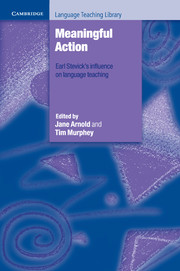Book contents
- Frontmatter
- Contents
- List of contributors
- Acknowledgements
- Preface
- Introduction
- Part A Meaning-making inside and between the people in the classroom
- Part B Meaningful classroom activity
- Part C Frameworks for meaningful language learning
- Epilogue: A way with words – perspectives on the contributions and influence of Earl W. Stevick
- Appendix: Words of tribute to Earl Stevick
- Index
3 - Engaging adult learners: what ELT can learn from neuroscience and educational theory
Published online by Cambridge University Press: 15 November 2023
- Frontmatter
- Contents
- List of contributors
- Acknowledgements
- Preface
- Introduction
- Part A Meaning-making inside and between the people in the classroom
- Part B Meaningful classroom activity
- Part C Frameworks for meaningful language learning
- Epilogue: A way with words – perspectives on the contributions and influence of Earl W. Stevick
- Appendix: Words of tribute to Earl Stevick
- Index
Summary
Introduction
In his seminal work, Memory, Meaning and Method, Earl Stevick stresses the ‘power and the pervasive role of emotional factors’ in the foreign language learning process while pointing out that ‘just how these emotional factors influence the process of memory is still the subject of some discussion’ (Stevick 1996: 7). In this chapter, I draw on some new findings from neurobiology and educational theory to discuss the role of positive and negative emotions in engaging adult students in the foreign language learning process. I also refer to some key insights from those areas into the impact that emotional processes have on memory.
When adults talk about their foreign language learning experiences, they frequently mention that being able to communicate in a foreign language gives them pleasure. We can assume that part of this rewarding activity is the ability to understand and formulate complex thought in that language, to use it as a means of expressing creativity and to develop the ability to understand what others say. At least some students might also enjoy using the foreign language as a gateway that provides access into cultural contexts and helps them develop interpersonal skills through a process called empathy (Stevick 1996: 144), that is, the ability to put themselves in someone else's shoes, or see the world through his or her eyes.
The opposite can also happen. Being a learner of a foreign language, especially during the early stages of the learning process, can be a frustrating experience. Paul, a former colleague of mine – a highly respected maths teacher with a deep interest in political science, very well read, and an eloquent and entertaining communicator in his mother tongue – mentioned his frustrating experiences with learning Spanish as a foreign language:
It's alright as long as I am in one of those typical travelling situations, when I order a meal, check in at an airport or something like that. But as soon as I want to have a real conversation with someone things become so tedious. Then small talk is not enough – but what do you do when small talk is all you have?
- Type
- Chapter
- Information
- Meaningful ActionEarl Stevick's Influence on Language Teaching, pp. 45 - 61Publisher: Cambridge University PressPrint publication year: 2013
- 1
- Cited by



